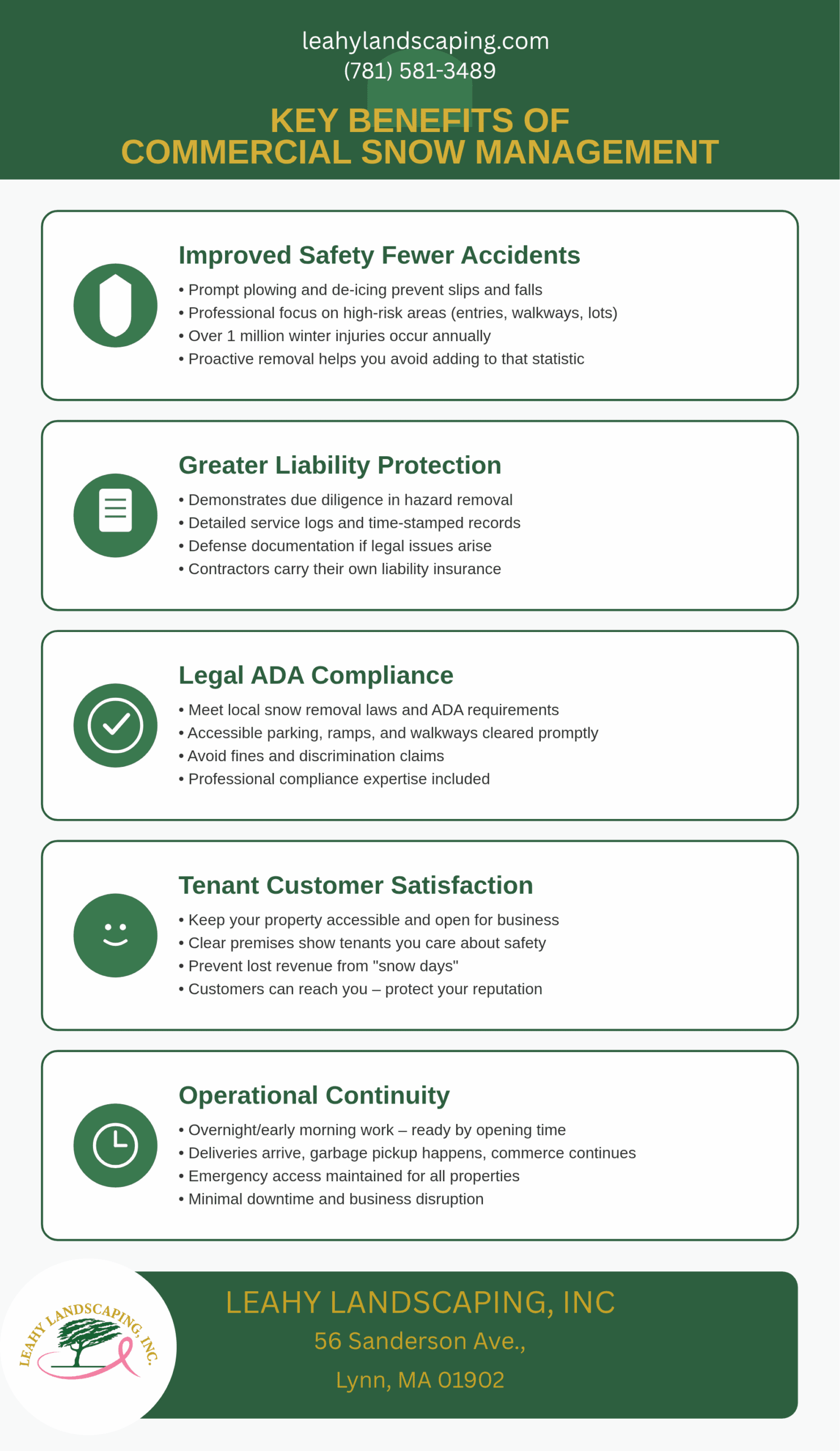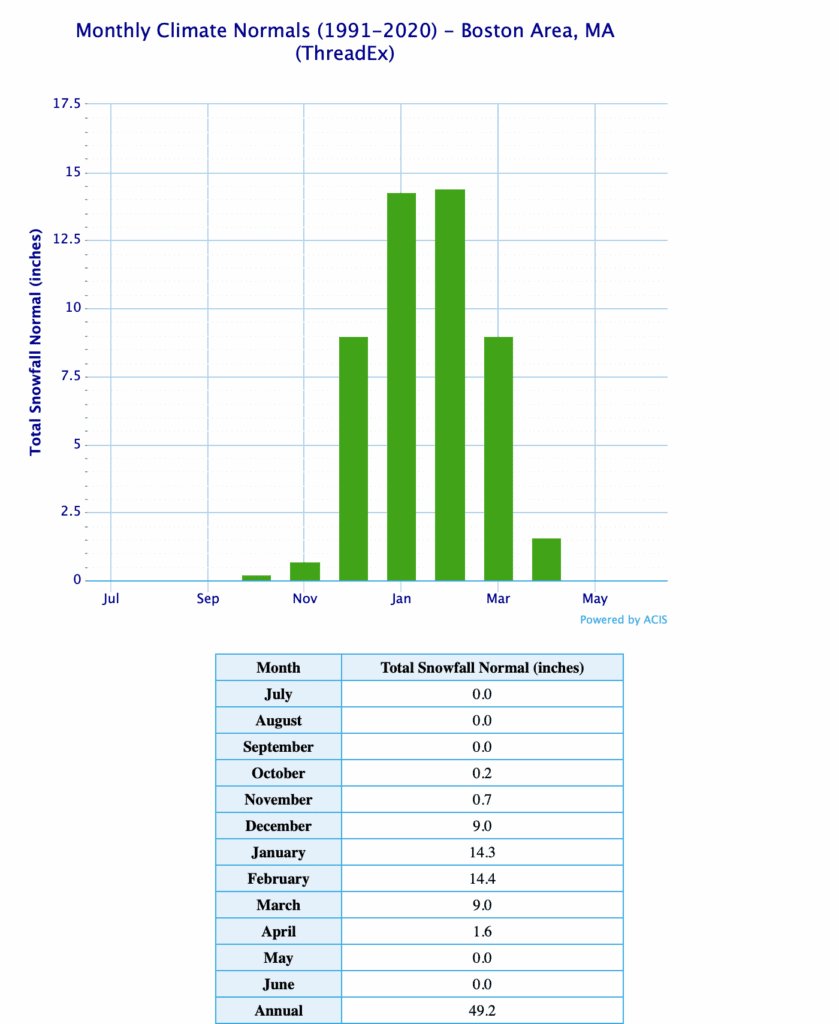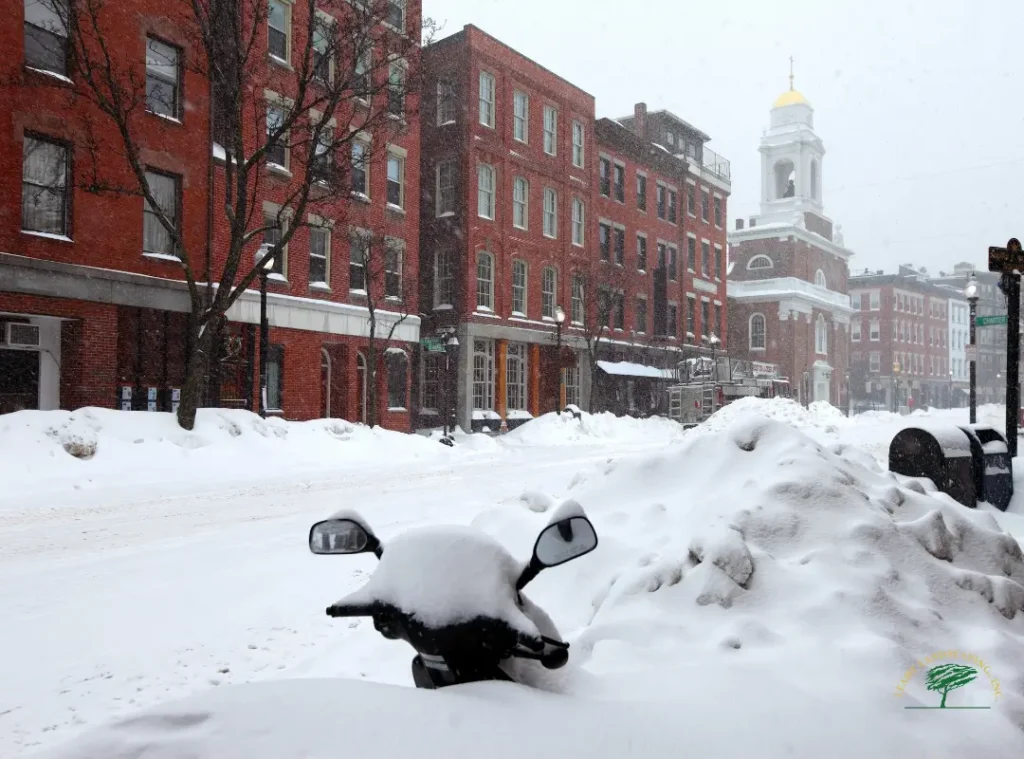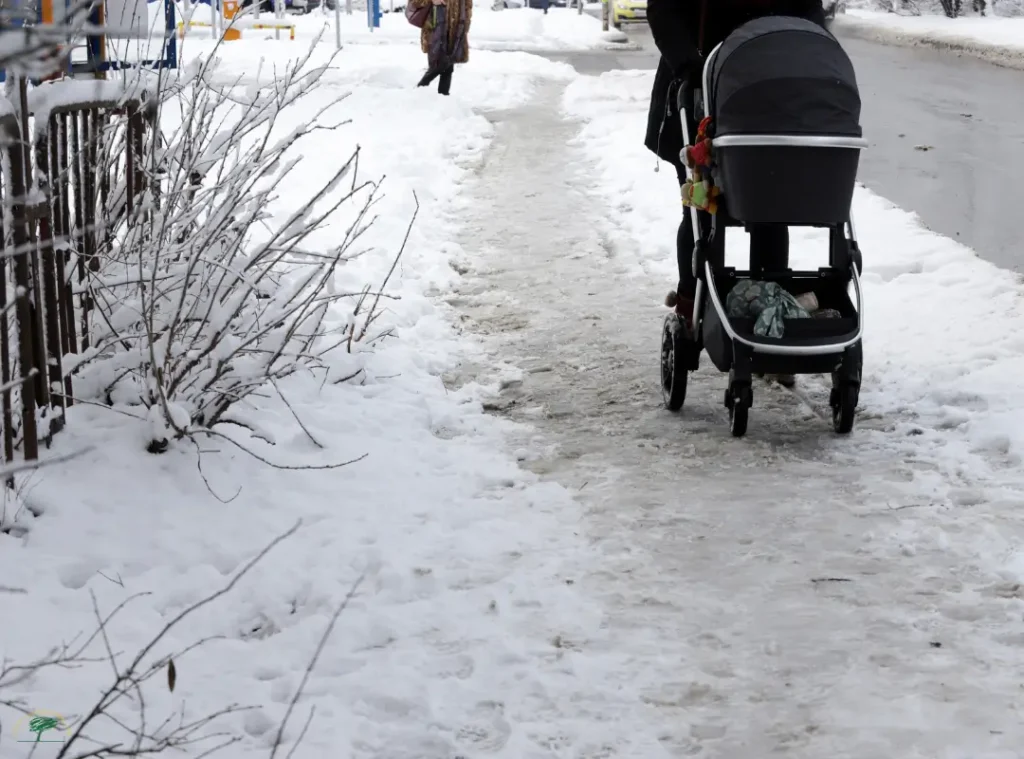Commercial Snow Removal in Massachusetts: Proven Benefits for Property Managers
Winter Liability By The Numbers
Property managers in Massachusetts’ North Shore (towns like Marblehead, Swampscott, Nahant, Salem, etc.) know that New England winters can make or break a commercial property’s operations.
Beyond being simply inconvenient, heavy snow and ice bring real safety risks, legal liabilities, and operational challenges.
Let’s explore why investing in professional snow plowing and ice management services delivers big benefits for local property managers.
We’ll look at the safety and legal advantages, the return on investment (ROI) data for outsourcing vs. DIY approaches, local snowfall stats underlining the need, the value of proactive seasonal planning
Table of Contents
The Real Costs of Skipping Professional Snow Removal
for North Shore, MA Property Managers
Slippery walkways and icy parking lots are a leading cause of winter injuries. According to the CDC, over 1 million Americans are injured every winter from falls on ice and snow, with 17,000+ of those injuries fatal.
For a property manager, one bad fall on your premises can mean a costly lawsuit or workers’ comp claim.
In fact, SFM Mutual Insurance reports “the average winter slip-and-fall lost-time claim to be between $50,000 and $55,000. The costs — direct and indirect — mount quickly and can’t be ignored.”
One legal survey notes typical slip-and-fall settlements average between $10,000 and $50,000. And a study by Zurich Insurance shows the average public claim for snow/ice slip/fall is about $15,132, with the average employee claim about $35,132.
These figures underscore how expensive “going cheap” on snow removal can be if an accident occurs.
Snow-related closures can cost cities and businesses a fortune. Independent economic analysis shows a single snow day costs Massachusetts about $265 million in lost activity—mostly wages—while severe seasons have topped $1 billion in losses.
Keeping up with snow removal keeps tenants, employees, and customers happy – no one wants to trudge through snow or worry about slipping on their way into a store or office.
In short, professional snow services protect the well-being of everyone on the property and the reputation of the property manager.
| Metric | Figure | Why it matters | Source |
|---|---|---|---|
| Annual U.S. injuries from snow/ice falls | 1,000,000+ injuries; 17,000+ fatal | High baseline risk; a single incident on your property can be costly. | CDC |
| Average winter slip-and-fall lost-time claim | $50,000–$55,000 | One claim can outweigh a full season’s professional snow contract. | SFM Mutual Insurance |
| Typical slip-and-fall settlement range | $10,000–$50,000 | Even “average” cases are expensive; documentation & prevention matter. | Legal survey |
| Average public slip/fall claim (snow/ice) | $15,132 | Represents non-employee incidents (customers/visitors). | Zurich Insurance |
| Average employee slip/fall claim (snow/ice) | $35,132 | Direct impact on workers’ comp and staffing. | Zurich Insurance |
| Economic cost of a single Massachusetts snow day | $265,000,000 (statewide) | Closures and reduced activity hit revenue; staying open matters. | Independent analysis |
Winter Liability by the Numbers:
Why Prevention Matters

Let’s look more at legal liability protection: Since a landmark 2010 Massachusetts court ruling, property owners can be held liable for injuries caused by snow and ice on their property – gone are the days when you could ignore “natural accumulations.”
The ruling in Papadopoulos v. Target Corp. made it clear that all MA property owners (commercial and residential) have a legal duty to exercise reasonable care in keeping their property safe from snow and ice hazards.
Failing to do so can result in costly lawsuits if someone is injured.
By hiring a professional snow service, you dramatically reduce the chance of accidents and liability on your property.
Snow or ice can shut operations, costing businesses a large share of daily revenue (state-level losses run into hundreds of millions).
Fewer accidents means fewer lawsuits and insurance claims which offers a direct boost to your bottom line and peace of mind.
Just as important, reputable snow contractors document their work (timestamps, logs, or photos), providing evidence that your property was maintained safely. This documentation can be a lifesaver if a liability claim does arise, demonstrating you took “reasonable steps” to keep the premises safe.
Important North Shore, MA
Snow & Ice Removal By-Laws
Marblehead
In Marblehead, MA, Town By-Law Chapter 162, Article III prohibits any person from depositing “any snow and/or ice on or against … any sidewalk or roadway.” Violators face a penalty of $50 for each offense.
Swampscott
In Swampscott, MA, General By-Laws (Article V, Section 4) state that the owner of any building or lot abutting on a street with a sidewalk must clear snow and ice within 12 hours after the snow ceases for non-residential properties. Placing snow or ice on any portion of a street or sidewalk that has been cleared is prohibited. The penalty: first offense is a warning; second and subsequent offenses: $50.00. (Swampscott, MA General By Laws)
Salem
In Salem, MA, property owners must remove snow and ice from bordering sidewalks within 6 hours after snowfall ends or the town’s snow emergency lights go off, whichever is later. Fines are listed at $25 for first offense, $75 for second, $100 for third+. (Patch.com)
Newburyport
City of Newburyport: Property owners must remove snow and ice from adjacent sidewalks “within six hours after the snowing ends, or before noon if the snow ends during the night.” A fine of $50 per event is specified. (Newburyport Snow & Ice Plan)
Nahant
By-law states that during snow or ice removal on public streets, the town’s Superintendent of Public Works may remove any vehicle interfering; the owner is liable for removal and storage costs. (Nahant Police By Laws)
Manchester‑by‑the‑Sea
Its snow and ice control policy notes that it is against the law (Ch. 85 Sec. 7B and Town by-law Ch. 85 Sec. 5) to push, plow or block sidewalks/roadways when clearing property.
Many cities and towns impose fines or deadlines for snow removal as well. (For example, in Boston commercial sidewalks must be cleared within 3 hours after a storm.) Failing to clear could mean violating local ordinances or state law.
Important North Shore Snow & Ice By-Laws
Marblehead
Town By-Law Chapter 162, Article III prohibits any person from depositing “any snow and/or ice on or against … any sidewalk or roadway.” Violators face a penalty of $50 for each offense.
Swampscott
General By-Laws (Article V, Section 4) require property owners to clear snow and ice within 12 hours after the snow stops for non-residential properties. Placing snow or ice on cleared streets or sidewalks is prohibited. Penalties: Warning for first offense, $50 for each subsequent offense.
Salem
Property owners must remove snow and ice from sidewalks within 6 hours after snowfall ends or when snow emergency lights turn off, whichever is later. Fines: $25 for first offense, $75 for second, $100 for third and beyond.
Newburyport
Property owners must clear adjacent sidewalks “within six hours after the snowing ends, or before noon if the snow ends overnight.” Fine: $50 per event.
Nahant
During snow or ice removal on public streets, the Superintendent of Public Works may remove any vehicle that interferes with operations. The owner is liable for removal and storage costs.
Manchester-by-the-Sea
Town by-law (Ch. 85 Sec. 5) and state law (Ch. 85 Sec. 7B) prohibit pushing, plowing, or blocking sidewalks and roadways when clearing property.
Key Benefits of Commercial Snow Management
Improved Safety & Fewer Accidents
Prompt plowing and de-icing prevent slips. Professionals focus on high-risk areas (entryways, walkways, lots) and use proper treatments to eliminate ice. Fewer accidents means less chance of injury on your watch. (Over 1 million injuries occur each winter due to snow/ice – proactive removal helps avoid adding to that statistic.)
Greater Liability Protection
By outsourcing, you show due diligence in hazard removal. Detailed service logs and time-stamped records from your contractor can defend you in court if needed. Plus, contractors carry their own liability insurance.
Legal/ADA Compliance
Professionals ensure you meet local snow removal laws and ADA requirements. They won’t forget the accessible parking spots or ramps – avoiding fines that some states impose for blocking accessible parking.
Neglecting this could lead to fines or discrimination claims. A professional snow service helps ensure wheelchair ramps, handicap parking, and walkways are promptly cleared and salted, keeping you in compliance and welcoming all visitors.
Tenant & Customer Satisfaction
Let’s not forget the operational and tenant satisfaction benefits. For commercial properties – whether an office park, retail center, or apartment complex – snowstorms can grind business to a halt. Employees might not make it to work, loading docks and driveways become unusable, and tenants or customers are unhappy if they arrive to find lots unplowed.
A reliable snow contractor keeps your property accessible and open for business. They often begin plowing before the storm even ends, ensuring parking lots, entrances, and sidewalks stay clear so normal operations can continue. This means minimal downtime and disruption – a huge deal when even a single “snow day” can cost local businesses thousands in lost revenue.
Clear, safe premises keep tenants happy and businesses open. Prompt snow service shows tenants you care about their safety and schedules. It also prevents lost business – customers can reach you, and you won’t suffer reputation damage from being “the one place that didn’t bother to plow.”
Operational Continuity
Snow experts work overnight and early morning so your property is ready by opening time. Deliveries can arrive, garbage pickup happens, and daily commerce carries on. Emergency access is maintained too – important for multi-family residences or healthcare sites.
Winter Weather Trends: How Massachusetts Snowfall Impacts Operations
The North Shore of Massachusetts is no stranger to harsh winter weather. This coastal region sees significant snowfall each year, alongside the threat of nor’easter storms that can rapidly bury the area in snow. To appreciate why proactive snow removal is so critical here, let’s look at some local climate data and storm history.
Boston-Area Annual Snowfall
North Shore communities typically get anywhere from about 40 to 60 inches of snow per winter on average. For example, Marblehead’s 1991–2020 climate normals show roughly 39 inches of snow annually.
Just a bit north, Newburyport averages about 61.9 inches per year. Salem sits in between with estimates in the ~45–50 inch range. In any case, these figures are well above the U.S. average and even a bit above the Massachusetts state average (~51″). In practice, this means property managers can expect numerous plowable snow events each season – and occasionally extremely snowy winters far exceeding the average (Boston’s record 2014–2015 winter brought over 110″ of snow!).
Simply put, the North Shore gets enough snow each winter that having a removal plan is a necessity, not a luxury.



Frequent Storms and Nor’easters: Coastal Massachusetts often bears the brunt of powerful nor’easters – winter storms with high winds and heavy precipitation.
These storms can unload a month’s worth of snow in a day or two. For instance, at the end of January 2022, a classic nor’easter (dubbed a “bomb cyclone”) struck the region.
The National Weather Service reported widespread totals of 1 to 2 feet of snow across the North Shore in that single weekend storm . Individual town reports included about 20 inches in Marblehead and 26 inches in Swampscott from that event – over two feet in 24 hours!
This level of snowfall can cripple a property if not addressed immediately.
Snow drifts, buried sidewalks, and impassable lots happen fast. And notably, blizzard conditions (high winds + snow) were observed in multiple North Shore locations (Beverly, etc.) during that storm , complicating removal efforts with blowing snow and zero visibility.
For property managers, these kinds of storms underscore why having professional crews on call 24/7 is so important.
When a nor’easter hits, you need all hands on deck to clear continuously and keep ahead of accumulation – which is exactly what commercial snow contractors do.
Ice and Freeze-Thaw Cycles: Being coastal, towns like Nahant, Swampscott, and Marblehead also deal with fluctuating temperatures that cause ice. Daytime melt and nighttime freeze can turn cleared areas into skating rinks.
Regular salting and ice management is key to prevent hazardous black ice. North Shore winters often see storms followed by deep freezes (and vice versa), so a professional service’s vigilance in de-icing pays off here. They apply treatments pre- and post-storm to ensure that when the inevitable refreeze happens, your walkways and lots remain safe.

Proactive Seasonal Planning: The Power of Preparedness & Snow Management Contracts
When it comes to snow management, the best offense is a good defense. Property managers who secure contracts before the first flake falls are the ones who stay calm when storms hit.
On the North Shore, most seasoned managers finalize agreements long before the first plow rolls.
Guaranteed Priority Service
Snow contractors only take on so many clients per storm. If you wait until snow is in the forecast, you’ll be calling around to find someone who isn’t already booked — or worse, paying emergency rates.
With a seasonal contract, you’re a priority client. Contractors plan their routes around you, keeping your site clear while others are still waiting. Many local providers also offer pre-storm planning, mapping your property and setting up coverage plans in advance.
Predictable Costs and Less Stress
Seasonal contracts usually come with a fixed winter rate, so your budget stays steady no matter how wild the weather gets. You’ll know exactly what you’re paying from November through March, covering plowing, salting, and typical snow events.
If it’s a harsh winter, your contractor takes the hit — not you. And if it’s mild, you’ve still bought peace of mind. Some even offer multi-year discounts for locking in early.
Clear Scope and Fewer Surprises
A good contract spells out everything: Plowing, walkways, and salting, trigger depth, return visits for snow piles or ice buildup. That means no arguments about “one plow per storm” or surprise line items. It’s all detailed upfront.
Faster Response and Active Monitoring
Contracted clients get proactive attention. Many companies track forecasts, pretreat surfaces with brine, and use GPS dispatch for 24/7 alerts. If a squall hits at 3 AM, they’re already on it.
They’ll also do preseason walkthroughs, noting obstacles and snow pile zones — saving time and damage later.
Compliance and Peace of Mind
With a contract, your property stays within local snow removal laws keeps you from scrambling to meet city deadlines. Contractors handle the timing, so you’re not risking fines or liability for icy conditions. Many even return the next morning for refreeze checks and sanding.
Emergency Coverage Built In
Big storms happen. Most contracts include blizzard contingencies for hauling or extra crew mobilization. Instead of panicking during a record snowfall, you’ll know exactly who’s coming and what’s covered.
Dedicated Snow Management Across the North Shore
Our commercial snow management routes cover the entire North Shore and Southern NH, including major communities like Salem, Lynn, Nahant, Newburyport, and Manchester-by-the-Sea.
We’re currently building out detailed pages for each of our service areas. You can see examples of our work and specific service details for the towns below:
Commercial Snow Plowing in Marblehead, MA
Commercial Snow Plowing in Swampscott, MA
(More featured town pages coming soon!)
Stay Ahead of Winter with Leahy Landscaping
Snow season doesn’t wait — and neither should you. Since 1984, Leahy Landscaping has helped North Shore businesses stay safe, compliant, and operational through every storm.
Secure your seasonal snow and ice management contract today to guarantee priority service and predictable costs all winter long.
Serving Marblehead, Swampscott, Nahant, Salem, and surrounding towns.
Request a Snow Management Quote →
Some images © Canva Pro, used under license.


